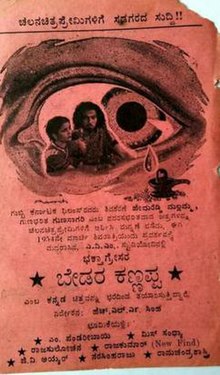
Singanalluru Puttaswamaiah Muthuraj, better known by his stage name Dr. Rajkumar, was an Indian actor and singer who worked in Kannada cinema. Regarded as one of the greatest and versatile actors in the history of Indian cinema, he is considered a cultural icon and holds a matinée idol status in the Kannada diaspora, among whom he is popularly called as Nata Saarvabhouma, Bangarada Manushya, Vara Nata, Gaana Gandharva, Rasikara Raja, Kannada Kanteerava and Rajanna/Annavru. He was honoured with Padma Bhushan in 1983 and Dadasaheb Phalke Award in 1995. He is the only lead actor to win National Award for Playback singing. His 39 movies have been remade 63 times in 9 languages by 34 actors making him the first actor whose movies were remade more than fifty times and the first actor whose movies were remade in nine languages. He was the first actor in India to enact a role which was based on James Bond in a full-fledged manner. The success of his movie Jedara Bale is credited to have widely inspired a Desi bond genre in other Indian film industries. On the occasion of the "Centenary of Indian Cinema" in April 2013, Forbes included his performance in Bangaarada Manushya on its list of "25 Greatest Acting Performances of Indian Cinema". Upon his death, The New York Times had described him as one of India's most popular movie stars.
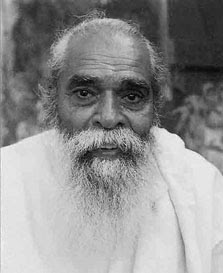
Ganapathi Venkataramana Iyer was an Indian film director and actor. He was nicknamed "Kannada Bheeshma". His film Adi Shankaracharya (1983) won four National Film Award, including Best Film, Best Screenplay, Best Cinematography and Best Audiography. His film Swami Vivekananda (1998) was nominated in the Best Film category at the Bogotá Film Festival, for which Mithun Chakraborty won the national award for Best Supporting Actor.

Pandari Bai was an Indian actress who worked in South Indian cinema, mostly in Kannada cinema during the 1950s, 1960s and 1970s. She is considered Kannada cinema's first successful heroine. She has acted as both heroine and mother to stalwarts such as Rajkumar, M. G. Ramachandran, Sivaji Ganesan. She was the heroine in Rajkumar's debut movie Bedara Kannappa and also Sivaji's debut movie Parasakthi. She has acted in over 1,000 films in Kannada, Tamil, Telugu and Hindi. Bai was honoured by Kalaimamani from the Tamil Nadu government.
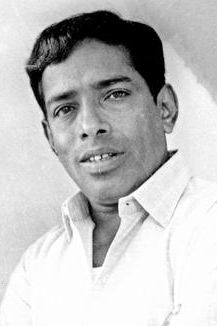
Tiptur Ramaraju Narasimharaju was an Indian Famous legendary actor in Kannada cinema who specialised in roles that required ample comic timing. He was the comedy stalwart of the Kannada film industry. He acted in more than 250 Kannada films between 1954 and 1979. He was also referred to as Hasya Chakravarti.

Gubbi Hampanna Veeranna was an Indian theatre director. He was one of the pioneers and most prolific contributors to Kannada theatre. He established the drama company, Gubbi Sree Channabasaveshwara Nataka Company, which played a crucial role in promoting the Kannada theatre field. He has been conferred the title Nataka Ratna meaning "A Precious Jewel" in the theatre world. Gubbi Veeranna laid the foundation stone for the Kannada film industry. He established a studio, produced silent films in early days of cinema and produced good Kannada short films, He built theaters and introduced many actors including Dr Rajkumar, G.V Iyer, B.V Karanth, Girish Karnad and others to the Kannada film industry.

Singanalluru Puttaswamaiah Muthuraj, better known by his stage name Dr. Rajkumar, was an Indian actor, singer and producer who worked in Kannada cinema. Through his over five-decade long career of over 200 films, he was regarded one of the most pivotal and influential figures of the Kannada film industry. His films were praised for acting as a bridge between the popular and art films because of the theme of the story and their treatment. He debuted as a child actor in the 1942 Kannada film Bhakta Prahlada. His first role as an adult came in Sri Srinivasa Kalyana (1952) and as a lead, two years later, in Bedara Kannappa, which gave him stardom. He debuted as a singer with the track Om Namaha Shivaya from the 1956 film Ohileshwara. In 1960, he made his debut as a producer by producing Ranadheera Kanteerava. According to Ashish Rajadhyaksha and Paul Willemen in the book Encyclopedia of Indian Cinema, Ranadheera Kanteerava was the first "big hit" in Kannada cinema. In a film career spanning fifty years, Rajkumar received eleven Karnataka State Film Awards, including nine Best Actor and two Best Singer awards, eight Filmfare Awards South, and one National Film Award. Along with Vishnuvardhan and Ambareesh, he is counted in Kannada cinema's "triumvirate" as its most celebrated actor.
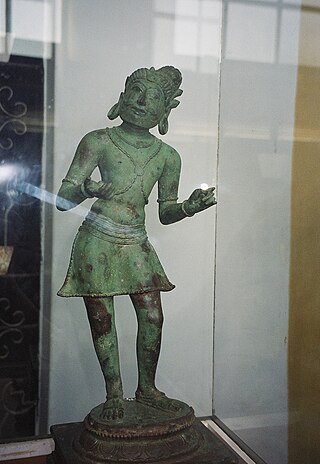
Kannappa is a legendary figure in Tamil, and more broadly Hindu, folklore who was a devoted follower of the Hindu god Shiva. He is closely associated with the Srikalahasteeswara Temple in Andhra Pradesh, India. According to the folktale, Kannappa, originally a hunter, plucked out one of his eyes as an offering to a lingam. However, before he could pluck out the second eye, Shiva intervened. He is revered as one of the 63 Nayanars, a group of Shaiva saints.

Kalahasti Mahatyam is a 1954 Indian Telugu-language film directed by H. L. N. Simha starring Dr. Rajkumar. This is the only non-Kannada film starring Dr. Rajkumar.
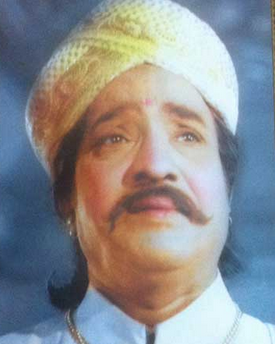
Tirumakudalu Narasipura Balakrishna was an Indian actor in Kannada cinema. He was said to have a hearing problem and some say that he was totally deaf. However, he would catch the lip movements of the artists and would narrate the dialogues spontaneously. He was popular for his comic and villainous roles in films like Kantheredu Nodu (1961), Muriyada Mane (1964), Bangaarada Manushya (1972), Gandhada Gudi (1973) and Kaamana Billu (1983) and appeared in numerous versatile roles over a hundred films that starred Rajkumar in the lead role.

Singanalluru Puttaswamayya Varadaraj was an Indian actor and producer in Kannada cinema. He produced films such as Bhootayyana Maga Ayyu starring Lokesh, and Hemavathi starring Udaykumar.
Nata Sarvabhouma is a 1968 documentary film on Rajkumar directed by Aaruru Pattabhi. It was made coinciding the occasion of the release of his 100th film Bhagyada Bagilu. The documentary introduced Rajkumar's village, home, family members and also contained clippings of some of his films. It also has the footage of his felicitation by Gubbi Veeranna and conferring him the title "Nata Sarvabhouma".
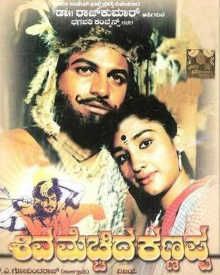
Shiva Mecchida Kannappa is a 1988 Indian Kannada-language film directed by Vijay. The film is a rehashed version of the 1954 film Bedara Kannappa, the debut film of actor Rajkumar. Produced by Raghavendra Rajkumar, the film is about the life of Kannappa, a hunter who becomes a Lord Shiva devotee; Kanappa is played by Puneeth Rajkumar in younger days and Shivarajkumar in adult life. The rest of the cast includes Geetha, Sarala Devi, C. R. Simha and Rajkumar himself playing a brief cameo role in the role of Shiva. The film has musical score by T. G. Lingappa and the dialogues and lyrics written by Chi. Udaya Shankar.
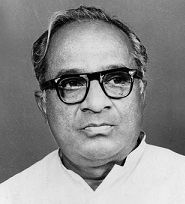
Hunsur Krishnamurthy was an Indian playwright, film director, producer, actor, screenwriter and lyricist in Kannada cinema.

R. Nagarathnamma (1926–2012) was an Indian theatre personality and the founder of Stree Nataka Mandali, an all-women theatre group based in Bengaluru. A recipient of the Sangeet Natak Akademi Award, she was honored by the Government of India, in 2012, with the fourth highest Indian civilian award of Padma Shri.
Bhakta Prahlada is a 1942 Indian Kannada-language film directed by K. Subramanyam. The film stars M. V. Rajamma, Chandramma, A. N. Sheshachar and K. V. Achuta Rao. The film also saw Rajkumar's first appearance in a film. He played a school-going child alongside his brother S. P. Varadappa; their father Singanalluru Puttaswamayya played Akhandasura.
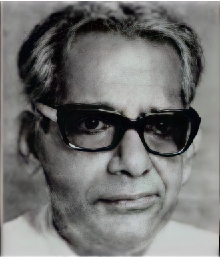
K. R. Seetharama Sastry popularly known as Ku. Ra. Seetharama Sastry or simply Ku. Ra. Si was an Indian actor, writer, lyricist and director in Kannada film industry. After a career in theatre, Sastry's career in films was those of an actor, director, producer, screenwriter, lyricist and an occasional composer. He is considered one of the most influential personalities in the history of Kannada cinema.
Dikki Madhava Rao was an Indian actor and singer known for his work as a character actor in Kannada-language films. He spent much of his early years as a stage actor in the 1920s and 1930s before appearing in Kannada films. He gained popularity with his role as the antagonist Kanyakumari Dikshit "Dikki" in the 1936 film Samsara Nauka. Subsequently, the name stuck to him as prefix.
Shiv Bhakta also spelt as Shiv-Bhakta is a 1955 Hindu epic film directed by H.L.N. Simha starring Shahu Modak and Padmini in lead roles. It was a mythological film produced by AVM productions and it was directed by H. L. N. Simha with music by Chitrgupta. The songs were penned by Gopal Singh Nepali. Songs were considered evergreen. There are excellent classical dances by Padmini in this film. This was Padmini's second Hindi film followed by Mr. Sampat (1952). The film is a remake of director - producer duo's 1954 Kannada film Bedara Kannappa. This Kannada movie was Kannada superstar Dr Rajkumar's first as a hero.
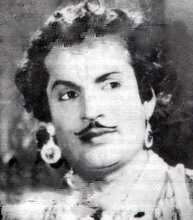
D. Kemaparaj Urs was an Indian freedom fighter, actor, director and producer who worked mainly in the Kannada film industry. His movies in 1940s and 1950s created an impact on the audience. Even before Dr. Rajkumar's arrival to the industry, Urs was already an established star. His elder brother D. Devaraj Urs, served as the Chief Minister of Karnataka.

Halebeedu Ramachandra Shastry, was an Indian actor and dubbing artist known for his work in Kannada cinema. In his career spanning more than 40 years, Shastry played a variety of supporting roles. He is noted for his performances in Bedara Kannappa (1954), Rayara Sose (1957), Bhoodana (1962), Sri Srinivasa Kalyana (1974) and Upasane (1974). Shastry's last movie was Pavana Ganga.
